Finding Your Own Way Home
by SealWyf, HSM editor
It’s hard to believe it’s been four years now — for Home this past December, for me in Home next February. Four is a good round number. It’s less satisfying than five, but still a considerable time in subjective “Home years” — several decades, at least. Sometimes it feels much longer.
Since we’ve made it this far, and since we’re not sure how much longer we’ll be here, it’s a good time to pause and look around us, and talk about this place. To look at where we’ve come, and remember what we left behind. To tally what we’ve gained and lost, and the things that never change. To mourn, and to celebrate. And to ask just what we’re doing here in PlayStation Home.
I find it astonishing that we still have to apologize to other gamers for loving Home. It’s bad out there. The assumption is that real gamers don’t use Home. You see it everywhere in the non-Home gamer press, in the articles and in the comments. They just don’t get it.
So one of the things that we who do get it need to ask, is why Home is such a guilty pleasure. Why is it seen as unworthy? And how can we explain its power to those who see Home only as the crowd of noobs in the Hub? Which includes, unfortunately, a lot of Home users as well, the ones who dropped in to take a look, found nothing of interest, and left, trailing wrathful clouds of criticism.
It’s a difficult question. and so I’m going to take a major digression here, and talk about human motivation. Because I have found that, if an answer eludes you, it sometimes helps to ask a larger question, then work back to particulars. So, since, we are having trouble with “Why is Home seen as unworthy by many gamers?”, let’s look at a larger, surrounding question: “Why do people game?” And I’m going to surround that question with an even larger one, a truly titanic question: “Why do people do anything?” And then I’ll attempt to answer it.
Why do people do anything? There are certainly a number of valid answers. But the one I’m going to propose here is a principle I’ve found useful in understanding human behavior. It is, in fact, one of the major pillars of “SealWyf’s Theory of Nearly Everything.”
And it is this: “Given a choice, people do what makes them feel good about themselves.”
 As simple and obvious as this may seem, it’s often ignored. But I believe that feeling good about yourself, the state popularly called “self-esteem”, is one of the basic human needs, right up there with food, shelter, sexual congress, good relationships, challenging work, the respect of one’s peers, and owning really cool electronic toys. In fact, those other needs can be best understood by how people feel about themselves while meeting them. Self-esteem is a meta-need, one that modifies and focuses all the other needs, the ones we had assumed were basic. It dictates the choices we make.
As simple and obvious as this may seem, it’s often ignored. But I believe that feeling good about yourself, the state popularly called “self-esteem”, is one of the basic human needs, right up there with food, shelter, sexual congress, good relationships, challenging work, the respect of one’s peers, and owning really cool electronic toys. In fact, those other needs can be best understood by how people feel about themselves while meeting them. Self-esteem is a meta-need, one that modifies and focuses all the other needs, the ones we had assumed were basic. It dictates the choices we make.
Let’s take food as an example. That’s pretty basic — as animals, we need to eat. But food in human culture is much more than survival. We use our food choices to feel good about ourselves.
Some people gravitate toward the comfort-food end of the spectrum: burgers and pizza and bacon. It tastes good, but that’s not all that is going on — it can also be an ethos. (If you have any doubt of that, do a Google search on “bacon”.) And those who subscribe to the “comfort-food” ethos look down on those who prefer the “foodie” ethos — the ones who follow celebrity chefs, and know the best source of locally-grown heirloom tomatoes and artisanal cheese. Each camp has adopted the food-ways that let them feel good about themselves — and, not coincidentally, look down on those who don’t.
Let’s push back from the dinner table and return to gaming. Because it’s time for yet another big question: “What is a game?”
One of the things that make an activity a game is a scoring system, a way to determine winners and losers. In board and card games, that’s all you have: someone wins, and someone else loses. But once technology got involved, scoring became more complex. Starting approximately with pinball machines, a game could store the high scores of previous players. And that meant leaderboards. Leaderboards imply bragging rights, and the obsession of getting the top slot on them.
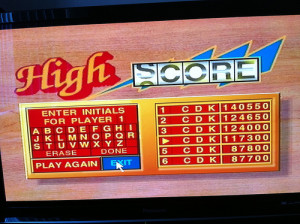 The world may have left the pinball machine behind, but the obsession with being at the top of the list is still with us, in the global leaderboards of networked games. The PSN added the extra dimension of cumulative ranks and trophies, which serve no purpose except to let people feel good about themselves. The network also lets them prove their superiority “in person”, by beating other people in multiplayer games. Given all the ways to win bragging rights, the networked console gaming industry may now be less about entertainment than about generating self-esteem. And self-esteem may be what is really for sale, when we buy games.
The world may have left the pinball machine behind, but the obsession with being at the top of the list is still with us, in the global leaderboards of networked games. The PSN added the extra dimension of cumulative ranks and trophies, which serve no purpose except to let people feel good about themselves. The network also lets them prove their superiority “in person”, by beating other people in multiplayer games. Given all the ways to win bragging rights, the networked console gaming industry may now be less about entertainment than about generating self-esteem. And self-esteem may be what is really for sale, when we buy games.
Which brings us back to Home, and the gamers who don’t get it. They’re a diverse population, but the one thing you can say about gamers is that they know how to play games. And a game makes it clear what the rules are, and what you have to do to win it. In other words, games tell you how to feel good about yourself. Can you beat this high score? Can you win the Platinum? Then you’re a terrific person. Better than those noobs over there, the ones with ranks in single digits, who play all their games in Dead Simple mode.
So these gamers, who understand games, arrive in Home and look around. And the first thing they ask is how to win. And there are no easy answers, because Home has no trophies, and no Home-wide leaderboards. Home doesn’t tell you how to feel good about yourself. It just drops you into the world, and lets you figure it out.
I think that’s what puts most gamers off. They know how to play games, and when they log into something on a gaming console, they expect to find a game. But Home doesn’t feel like a game. In fact, sometimes it feels surprisingly like real life. It can feel like being dumped back into a school you hated, where all the cool kids have their own little cliques, which you are never going to enter, no matter how hard you try, so don’t bother.
After a few evenings of being ignored for wearing a default shirt, and insulted for not having a keyboard, a lot of gamers leave. “I tried Home,” they say. “It was full of snobs, and it was boring. There was nothing to do there. I went back to ‘Black Ops’.” Home has lost them as a potential customer.
This is bad enough. But some of those bored, frustrated newcomers decide to stay, because they have discovered another way that Home can entertain them. They decide the easiest way to feel good about themselves here is to make other people feel inferior. They become experts at random petty annoyance and vicious insult — in short, Home’s trolls. I think we would have fewer of them if Home’s real strengths were easier to discover.
The truth is, it takes a while to figure this place out. It can take days, weeks, or even months. And that’s longer than most people will give it. I think the best single thing that Sony could do to lure more people into Home and keep them here long enough to understand the place, is add some PSN trophies. They might be for specific minigames, or they might be for aspects of Home itself. Trophies are gamer-bait. If you want gamers, that’s what you give them. Maybe by the time they have earned the trophies, they will have figured out how Home really works.
But those of us who live full-time in Home don’t need trophies. Because we have built our own games within the game, created our own quests and status markers. We have discovered how Home can make us feel good about ourselves. And in the process, we have gained real friendships and the respect of our peers.
In the world of Home, I believe that I have earned two Platinums — two genuine major achievements I am proud to list on my Home resumé.
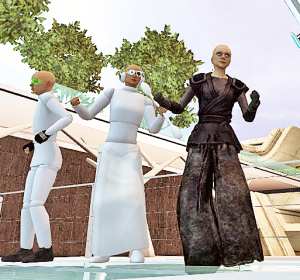 My first home “Plat” is that I’m a General in the Homeling Collective. Becoming a Homeling officer was something I worked for harder than I’ve worked on any game. And, unlike a game trophy, it’s an accomplishment that keeps on giving. These are incredibly cool people, engaged in one of Home’s most elaborate social role-plays. I consider them real friends, though we have never met face-to-face.
My first home “Plat” is that I’m a General in the Homeling Collective. Becoming a Homeling officer was something I worked for harder than I’ve worked on any game. And, unlike a game trophy, it’s an accomplishment that keeps on giving. These are incredibly cool people, engaged in one of Home’s most elaborate social role-plays. I consider them real friends, though we have never met face-to-face.
You can see my second Home “Plat” at the top of this article: I’m one of HomeStation Magazine’s Editors, a member of the small group that works behind the scenes to pull this all together. I list this as a Home achievement, because I sincerely believe that Home includes the galaxy of online content that Home has generated — the blogs and websites, forums and videos and magazines. These are things that would not exist if Sony had not created our virtual community.
Despite appearances, the point of this is not to brag or prove I’m better than anyone else. My Home successes make me feel good about myself, but that doesn’t mean I think that you, the reader, are not as worthy. There are many ways to succeed in Home. Some people climb the leaderboards. Some create machinima. Some specialize in Home’s active fashion and decorating scenes. Some start Home clubs. Some join the Home Community Volunteers. Some are active on the Forums. Some write for other Home-based media sites. Some form intense friendships, and even fall in love. Some become expert glitchers. And some Home users just have fun, relaxing at the end of a long work-day. It’s all good.
The point is, we all find our own ways to succeed here. We create our own challenges and markers for success. Some have discovered ways to fulfill their deepest life-dreams, and others are still searching. So perhaps the point I’m trying to make, in what may seem like a clumsy and self-serving fashion, is that what Home gives us is a wide-open playing field, a blank tablet, a way to define our own quests, and set our own criteria for winning. And that makes it more satisfying than any normal game, where the rules are set and success is handed to us.
Home is a game, but it’s a game in which we, the players, set the rules. That makes it an incredibly powerful force for creativity. If we who live in Home seem to be unreasonably addicted to it, to the point of falling into fits of bleak depression when we realize that Home will not exist forever, this is why. For us, Home has become a life-extender, a prosthetic device for the mind. It generates an incredible amount of feeling-good-about-oneself, as well as simple human happiness.
But learning how to use Home takes some practice and experimentation. Not everyone “gets it” immediately. And some seem to draw the wrong conclusions. So it’s our duty as Home residents to help the newcomers, and treat their boredom with compassion. To let them know that a few pieces of non-default clothing make a big difference in social acceptance, and that a USB keyboard is the best investment they can make. We were all there once. The “noob” you help today may become your best friend tomorrow.
But, even beyond the obvious things like clothing and keyboard, the most important secret you can tell Home’s newcomers is how this place works. Explain that it’s not like other games. There are no trophies and no Home-wide leaderboards. There are not really any tutorials. But that doesn’t mean there’s nothing to do here.
There is an infinite amount to do. But you have to go and find it. Because, while it’s open to debate whether Home is a game, it is definitely a world that repays exploration. And all of us, veterans as well as newcomers, have to figure it out, and discover its unique rewards — the ways Home can let us find success, as human beings as well as gamers.
That’s Home’s greatest challenge, and its greatest potential: we’re on our own here. We are building this. We all have to find our own way Home.


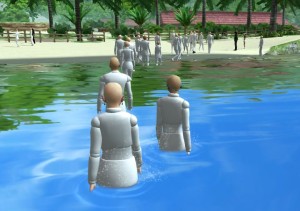
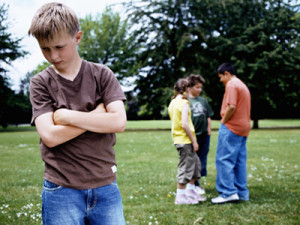
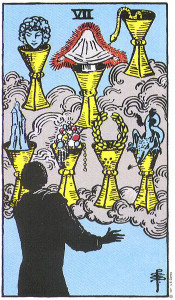
If Sealwyf’s words smell a bit like Black eyed peas, German sausage and saute mushrooms with a hint of Crown Black and Coke is because she took those words right out of my mouth! Except the part about Home being a game… I have snapped into action to correct people that I was “unintentionally” lurking around and some of their conversation spilled on me. “Home is not a game” I would slowly type with dyslexic unease. “home is a social platform with games in it”… because I, as a veteran of Home would know best… Is 4 dozen eggs on my face good for my pours?
After reading this epic… and I don’t use that word lightly like I do with the word “helium”… EPIC article I am now tasked with rethinking my stance on the whole “is Home a fricken game” thing. I tent to have to agree now that it is a game… a game we make up as we go. Maybe more than just a game, but a game non the less. Maybe it’s a game Sony is playing using us as their pawns… maybe we are the quintessential (thank you spellcheck)digital ant farm for Sony.
maybe were re each other’s ant farm. Maybe the are no ants and no farms and Soylent Green is made of people… “People…they are eating people”… i digress. What ever it is and how ever long it takes to learn or however long it last or how ever run on this sentence might be… I love Home and the life and/or game it has given me. Sadly, those that don’t get it, it’s a lost they will never understand how great! I now return you back to your less rambling comments already in progress.
P.S. the egg on my face is attracting the ants from the farm.
P.S.S. mmmmm eggs on soylent green = people and liquid chicken snacks
Those of us who loved the “Calvin and Hobbes” comic strip will understand what I mean when I say that Home is Sony’s version of Calvinball. For those of you who didn’t follow the strip, the only rules in Calvinball were that the players made up the rules as he went along, but the game could not be played the same way twice. More info here:
Calvinball article, Calvin and Hobbes Wiki>
So the philosophical question here is: “Is Calvinball a game?” Can something be a game if the rules keep changing? Or is the changeability of the rules a rule in itself, making the activity a game? It is no coincidence that “Calvin and Hobbes” was named after two philosophers.
Here is Calvin’s song about his game. Most of it could applied equally to Home:
Other kids’ games are all such a bore!
They’ve gotta have rules and they gotta keep score!
Calvinball is better by far!
It’s never the same! It’s always bizarre!
You don’t need a team or a referee!
You know that it’s great, ’cause it’s named after me!
If everyone who treat new people like the fragile babies that they are and help them discover Home for what it truly is, I think that we would gain new citizens every day and good ones at that. I always ask people in default clothing if they are new and try to help them understand things. I don’t assume they don’t know, I ask if they would like some help with anything they are confused about. I have found that many are just that, confused, as there are many choices and little direction in Home. I know that I was the first time I came here and there is much more here now than three years ago.
Great article Seal, I hope that people take the time to think through your points and I think that the sentiment, Home is what you make it, sums it up quite well.
Heh heh, A) Calvin and Hobbes rule. B) Home is NOT a game!!! LOL!
Sorry, I had to say it. It really gets under my skin when people run around saying what they damn well please to anyone, only to brush off any responsibility by saying “Hey, calm down, it’s just a game” after a deluge of insults. Olivia, you’re 100% right, Home is a social network *with* games to play within it. But I won’t argue with your metaphor Seal, and I did enjoy reading the article -- even agreed with the majority of it.
The original question though -- why does Home have such a bad rep in the world of “real gamers” is still a slippery, unanswered one though. To be honest, I laugh at the stipulation of what constitutes as a “real gamer” since so many males in gaming think that playing CoD obsessively for 5 years running is enough to call yourself that. IMO, it’s the total opposite. If the only food you could make was ( I dunno…) let’s say, pizza, would go around calling yourself a Chef!? If the one thing you could draw well was Garfeild the cat, would you call yourself an artist? Seeing my point here yet?
A gamer -- a REAL gamer -- is someone who knows the industry well, someone who will enjoy destroying Gannon *AGAIN!* as much as they will enjoy kicking ass in Tekken and won’t be a stranger to a bit of Peggle while waiting for a train. A proper gamer can ( and will) look at the mechanics of ANY game, regardless of how “cute” or “childish” it might look. Being a gamer is about having an open mind, a curious mind, an emotional mind, for these are the things that make up the essence of our entertainment. Anyone that instantly scoffs at you for using -and enjoying- Home is NOT a proper gamer. There is SO much more to our wonderful world of gaming, and dont let any damn CoD Monkey try to tell you otherwise.
*ahem*
/End Rant.